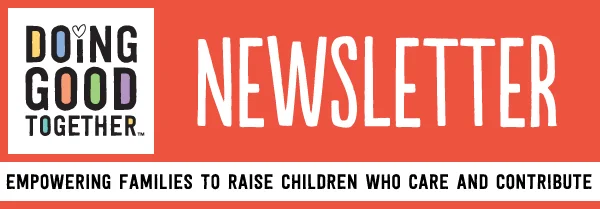ARE YOUR KIDS MISSING YOUR MESSAGE?
A fascinating study released last month (June 2014) by Making Caring Common, a project of the Harvard Graduate School of Education, reinforces what you as a reader of this newsletter already believe: If we value a more just and compassionate world, we need to put a greater focus on raising caring, kind children.
You place a high value on caring and compassion. But are your kids getting the message? According to this study, most are not. The researchers found that most children in middle school and high school value personal success (achievement and happiness) over concern for others, and they say their parents and teachers do, too.
The study calls this a rhetoric/reality gap - "a gap between what parents and other adults say are their top priorities and the real messages they convey in their behavior day to day." While a majority of adults say that raising caring children is primary, "our youth aren't buying it." Below, we suggest some ways to check that your actions are as intentional as you want them to be. Also be sure to read the report-it's only 16 pages and is filled with valuable information.
-Jenny Friedman, Executive Director
MODEL THE BEHAVIOR YOU WANT
Make a Difference...
Are you facing a rhetoric/reality gap? Here are tips to help you consider your own words and actions and what they really say to your children.
- Look at your calendar, and think about your daily routine. Because time is limited, how we spend it tells our children what we most value. Do you and your children make time to help neighbors, friends or community members?
- Consider your checkbook. Do you give to the causes you believe in? Do you let your children know what you support? Do you encourage them to share their money as well?
- The strategies suggested in the Harvard report read as if they're drawn straight from our own Big-Hearted Families toolbox. Here are ways to remind your children that concern for others is a priority:
- Together read books (start with the ones recommended in this newsletter each month), watch movies and share other media that demonstrate your values. Talk about them with your children. For more book ideas, see our comprehensive list or subscribe to our Big-Hearted Families Book Club.
- Give your child opportunities to "practice" caring. The folks at Harvard agree with us that empathy is a muscle that can be strengthened with use. Be sure your children contribute to the household, to their school and to the community. Here are dozens of simple project ideas.
- Be your children's emotion coach and help them deal constructively with strong emotions.
- Be a role model. Treat both your kids - and others - with kindness and respect. Your children are watching.
EXPRESS THE VALUE OF CARING
Talk About It...
Consider the conversations you have with your kids. What do you emphasize?
- Be explicit. Say to your children, "The most important thing to me is that you treat others kindly and fairly."
- Talk often about what a situation might feel like from another person's point of view. Do this while you're reading together ("Why do you think she made that decision?"), or when discussing a conflict your child is having with a friend or family member ("Why do you think he ignored you like that?")
- Print out our fortune teller and our placemat as fun ways to jump-start important conversations about kindness and caring.
Learn About It.....
The Spiffiest Giant in Town by Julia Donaldson (ages 3-7). George, a giant, believes his scruffy wardrobe needs an update, so buys some new threads. But he doesn't stay spiffy for long, as he runs into friends who need each item more than he does. A simple story about kindness and generosity.
INSPIRATION
"Go into the world and do well. But more importantly, go into the world and do good."
– Minor Myers, author

